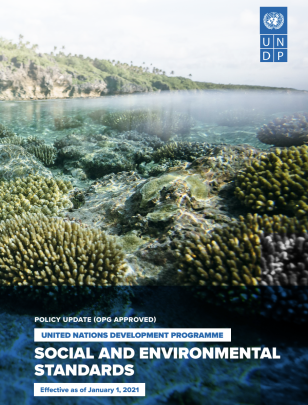UNDP
Accountability
Social and Environmental Sustainability in UNDP
UNDP is committed to ensuring that our programming and operations are socially and environmentally sustainable.
Sustainable Programme and project management
UNDP recognizes that social and environmental sustainability are fundamental to the achievement of sustainable development outcomes, and therefore must be fully integrated into our Programmes and Projects. To ensure this we have the following key policies, procedures and accountability mechanisms in place to underpin our support to countries:
- Social and Environmental Standards for UNDP Programmes and Projects
- Project-level Social and Environmental Screening Procedure
- Accountability Mechanism with two key functions:
1. A Stakeholder Response Mechanism that ensures individuals, peoples, and communities affected by UNDP projects have access to appropriate procedures for hearing and addressing project-related grievances.
2. A Compliance Review process to respond to claims that UNDP is not in compliance with UNDP’s social and environmental policies.
Environmentally sustainable operations
As a global leader in the fight against climate change, UNDP is committed to being green, sustainable, and just. UNDP has been climate neutral in its global operations since 2015 and has made an ambitious commitment to reduce its carbon footprint by 50% by 2050 through the Greening UNDP Moonshot. Read more ...
Sustainable procurement
To help countries achieve the simultaneous eradication of poverty and significant reduction of inequalities and exclusion, while at the same time address the issues of climate change, UNDP makes a shift to more sustainable production and consumption practices. Sustainable procurement means making sure that the products and services UNDP buys are as sustainable as possible, with the lowest environmental impact and most positive social results. Procurement, therefore, plays a key role in contributing to sustainable development.
Please find more information on the UNDP Procurement Website.
Related resources
- Framework for Advancing Environmental and Social Sustainability in the UN System
- UN Greening the Blue
Explore more
UNDP Social and Environmental Standards
The revised Social and Environmental Standards (SES) came into effect on 1 January 2021. The SES underpin UNDP's commitment to mainstream social and environmental sustainability in our Programmes and Projects to support sustainable development.
The SES are an integral component of UNDP’s quality assurance and risk management approach to programming. This includes our Social and Environmental Screening Procedure.
Key Elements of the UNDP's Social and Environmental Standards include:
Part A: Programming Principles:
- Leave No One Behind
- Human Rights
- Gender Equality and Women's Empowerment
- Sustainability and Resilience
- Accountability
Part B: Project-Level Standards:
- Standard 1: Biodiversity Conservation and Sustainable Natural Resource Management
- Standard 2: Climate Change and Disaster Risks
- Standard 3: Community Health, Safety and Security
- Standard 4: Cultural Heritage
- Standard 5: Displacement and Resettlement
- Standard 6: Indigenous Peoples
- Standard 7: Labour and Working Conditions
- Standard 8: Pollution Prevention and Resource Efficiency
Part C: Social and Environmental Management System Requirements:
- Quality Assurance and Risk Management
- Screening and Categorization
- Assessment and Management
- Stakeholder Engagement and Response Mechanism
- Access to Information
- Monitoring, Reporting and Compliance

UNDP's Social and Environmental Screening Procedure (SESP)
Screening and categorization of projects is one of the key requirements of the Social and Environmental Standards (SES).
In this regard, the objectives of UNDP's Social and Environmental Screening Procedure (SESP) are to:
- Integrate the SES Programming Principles in order to maximize social and environmental opportunities and benefits and strengthen social and environmental sustainability;
- Identify potential social and environmental risks and their significance;
- Determine the project's risk category (Low, Moderate, Substantial, High); and,
- Determine the level of social and environmental assessment and management required to address potential risks and impacts.

 Locations
Locations